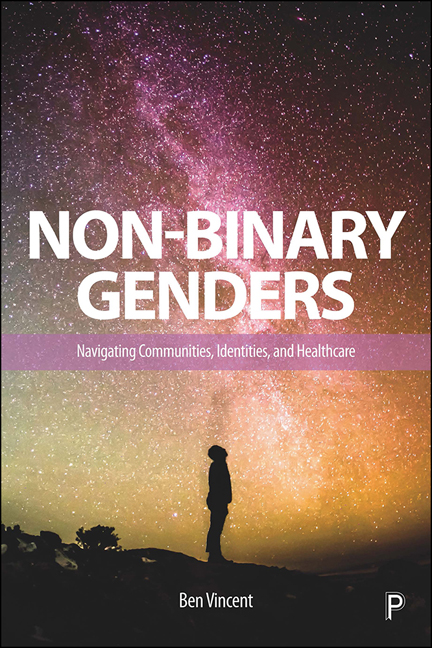Book contents
- Frontmatter
- Dedication
- Contents
- List of Figures and Tables
- Notes on the Author
- Acknowledgements
- Introduction
- 1 Reviewing Non-Binary: Where have we Come From?
- 2 Doing and Being: My Relationship with this Work, and how it was Done
- 3 ‘Not Trans Enough’: The Relationship Between Non-Binary Gender Identities, Uncertainty and Legitimacy
- 4 Non-Binary Times, Non-Binary Places: Communities and their Intersections
- 5 Views of the Clinic: Non-Binary Perceptions and Experiences of General Healthcare Services
- 6 A Strong Motivation to Tick The Boxes: Non-Binary Perceptions and Experiences of Gender Identity Clinics
- Conclusion
- References
- Index
6 - A Strong Motivation to Tick The Boxes: Non-Binary Perceptions and Experiences of Gender Identity Clinics
Published online by Cambridge University Press: 10 March 2021
- Frontmatter
- Dedication
- Contents
- List of Figures and Tables
- Notes on the Author
- Acknowledgements
- Introduction
- 1 Reviewing Non-Binary: Where have we Come From?
- 2 Doing and Being: My Relationship with this Work, and how it was Done
- 3 ‘Not Trans Enough’: The Relationship Between Non-Binary Gender Identities, Uncertainty and Legitimacy
- 4 Non-Binary Times, Non-Binary Places: Communities and their Intersections
- 5 Views of the Clinic: Non-Binary Perceptions and Experiences of General Healthcare Services
- 6 A Strong Motivation to Tick The Boxes: Non-Binary Perceptions and Experiences of Gender Identity Clinics
- Conclusion
- References
- Index
Summary
‘I did once express how I was feeling confused about my gender … and they promptly withdrew my diagnosis,’ ‘any sign of ambivalence is used as an excuse to delay your transition,’ ‘the fact that I confidently voiced uncertainty about my gender with the doctor meant that he didn't take my trans-ness seriously.’ This particular issue was even more acute for those who did not define unequivocally as male or female. (Ellis et al., 2015: 12–13)
Introduction
There exists a wide body of literature addressing access to medical services for gender transition (for example, Dewey, 2008, 2013; Ellis et al., 2015; Pearce, 2018). This chapter addresses non-binary people's views and experiences of gender identity services. Echoing the opening of Chapter 5, this chapter first reports participant views of specialist gender-related care. This includes the perceptions of those non-binary participants who have yet to, or do not intend to, access a gender identity clinic (GIC), as well as views on how non-binary communities as a whole perceive such care in the UK. I follow by considering experiences had of both NHS-run GICs and private medical care.
Non-binary views of medical practice related to gender transition
There was a strong sense of agreement among participants that avoiding any mention of non-binary identification, or claiming a binary-oriented identity would be their best tactical option for obtaining access to gender-affirming treatments as quickly and easily as possible. This is supported in Chapter 3 by Frankie's discussion of their specialist physician explicitly positioning trans men and women as ‘easier to treat’ than non-binary trans people. In considering how they would communicate at their first GIC appointment, Jamie noted in their diary that ‘I’m just gonna tell them I’m not female; that's not a lie.’ They went on to say that:
I haven't learned anything about their attitudes to nonbinary people that would convince me to do differently than bend the truth to the max. (Jamie, 24, diary)
That Jamie ‘[had]n't learned anything different’ reminds us of the common behaviour among trans people looking to access GICs to seek out as much information as possible about what to expect from their practitioners – using both official and community sources.
Information
- Type
- Chapter
- Information
- Non-Binary GendersNavigating Communities, Identities, and Healthcare, pp. 169 - 196Publisher: Bristol University PressPrint publication year: 2020
